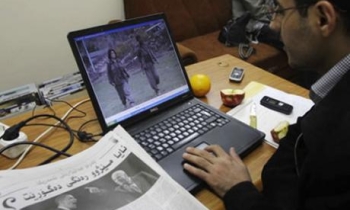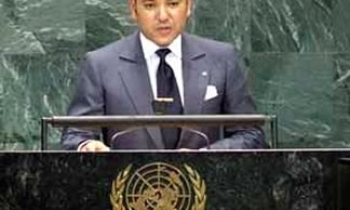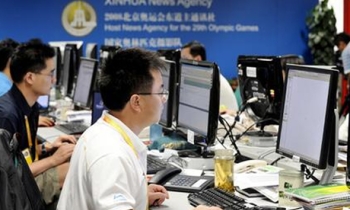A Caracas judge's decision last week to issue an order prohibiting news establishments from reporting on the investigation into the 2004 murder of prosecutor Danilo Anderson is being seen as an attempt by the state to censor the Venezuelan press.

Judge Florencio Silano, acting at the request of Attorney-General IsaÃas RodrÃguez, on January 23 barred the "publishing, spreading or exposition" of any information about the Anderson case. Among other things, RodrÃguez said he wanted to protect the prosecution's primary witness, Giovanny Vásquez de Armas, from "a media campaign of harassment and psychological pressure."
Local media have repeatedly questioned Vásquez's credibility. Vásquez has been convicted of fraud in his native Colombia and some press accounts have accused of collaborating with the FARC, a Colombian left-winged guerrilla group. Local reports say Vásquez was jailed in 2003 when he allegedly attended a meeting in Panama where Anderson's murder was planned, the Committee to Protect Journalists (CPJ) said.
Silano also directed the Public Ministry to investigate six television stations and four newspapers for alleged "obstruction of justice" by reporting on documents and witnesses related to the murder case, according to local reports. The obstruction charge is being investigated under the Law of Judicial Authority and the Law of Social Responsibility in Radio and Television, according to local reports. The "social responsibility" law, passed in 2004, has been widely criticised for falling short of international press freedom standards.
This law contains vaguely worded restrictions that severely limit freedom of expression. Under Article 29 television and radio stations that broadcast messages that "promote, defend, or incite breaches of public order" or "are contrary to the security of the nation" may be forced to suspend broadcasts for up to 72 hours.
The investigation is aimed at four private TV stations – Televén, RCTV, Venevisión and Globovisión, the Caracas-based Canal Metropolitano, the state-owned Venezolana de Televisión (VTV – as well as four daily newspapers – El Nacional, El Universal, Ultimas Noticias and El Nuevo PaÃs.

"This gag order is a shocking attack on press freedom and the right to information of all Venezuelan citizens," CPJ Executive Director Ann Cooper said. "We urge the prosecutor to withdraw his request, which actively suppresses these human rights."
"The Anderson case is fraught with political and media repercussions as two opposition journalists are accused of being among the instigators of the judge’s murder and certain independent news media have questioned the credibility of Vásquez, the prosecution witness against these two journalists," Reporters sans Frontières (RSF) said. "We fear this �obstruction of justice’ procedure is a judicial device for the government to yet again settle some scores with the privately-owned media and at the same time subject them to state censorship," RSF said in a statement.
Gonzalo MarroquÃn, president of the Press Freedom Committee of the Inter-American Press Association (IAPA), voiced "deep concern" and stressed that IAPA rejected any moves intended to restrain "freedom of press and the right to information." Further, he regretted the use of legal means to "prevent the media from informing on a legal process of public interest," Efe reported.
According to MarroquÃn, the ruling intended to "protect" Vásquez was simply made to meet "the desires" of Attorney-General RodrÃguez, who had previously rejected researches on the case the Venezuelan independent media had conducted and published. MarroquÃn reminded that over the last few years IAPA had reported that "restrictive laws" governing freedom of press had been passed in Venezuela, including the Constitution and the amendments to the crime code, as well as the content law enacted in 2005. Such legislations "involve a constant threat against the broadcasting media," in Venezuela, he underscored.
Steve Rendall, a Senior Analyst at the New York-based Fairness and Accuracy in Reporting (FAIR) was quoted by Venezuela Analysis as saying, "Information that may weigh on a defendant's guilt or innocence is not private information, it's public information and ought to be reported on." Reacting to the injunction, he said, "When you have a system where the government is able to stop the media from publishing public information, you have something less than a free press."

Anderson was the prosecutor in charge of investigating the alleged involvement of several businessmen, politicians, and former government officials in an April 2002 coup that briefly deposed President Hugo Chávez FrÃas. Anderson was blown up in his car in Caracas on November 18, 2004, in what some government officials termed a "terrorist act."
In December 2004 and January 2005, the local press quoted a Caracas councilman as saying that police had found a large amount of money at Anderson's apartment. The councilman, Carlos Herrera, alleged Anderson was linked to a ring of lawyers and prosecutors that sought money in exchange for halting investigations. RodrÃguez, however, said prosecutors were concentrating on three theories that indicated that Anderson was killed in retaliation for his work as a prosecutor.
Three men have been convicted of killing Anderson, but prosecutors believe others planned the assassination. In November 2005, Venezuelan authorities ordered the detention of four people accused of orchestrating the murder, including journalist Patricia Poleo, a columnist and director of the Caracas daily El Nuevo PaÃs who has supported the opposition in her work. Poleo has been in hiding for nearly three months. The government has said it will present evidence at trial and that the prosecution is not based on Poleo's work as a journalist.









